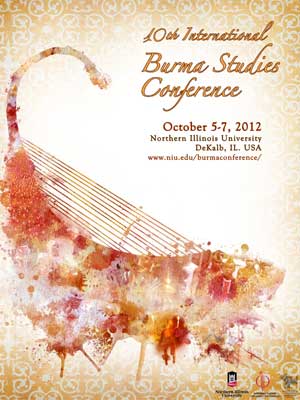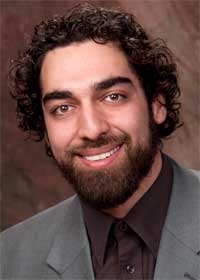When recent developments in Burma once again brought the sometimes troubled country into the headlines, Shahin Aftabizadeh was given the opportunity to speak as an expert on the region.
Aftabizadeh, who graduated this May from the master’s program at the Center for Burma Studies, appeared on an online news program called “The Stream.”
The program is hosted by Al Jazeera, an international Arabic language news network. Aftabizadeh and several other experts on Burma participated in a social media discussion utilizing Google+’s hangouts feature.
“It was interesting,” Aftabizadeh said. “I’ve done a lot of work with human rights groups, and then working specifically on video documentation of human rights abuses going on in Burma, but that was the first time I’d ever had a forum to speak to the media.”
After the program, Aftabizadeh was contacted by several academics and others in the United States with an interest in Burma studies, including the U.S. State Department, which interviewed him by phone. “I had a forum to talk about my own experiences and what I believed would be the best approach in terms of U.S. foreign policy as they begin opening up relationships with the reformed government,” he said.
Aftabizadeh, whose research has focused primarily on political opposition movements on the Thai-Burmese border, spent almost two years living there before applying to NIU. “NIU is the national center in the country for Burma Studies, and I knew of a few faculty members who focused on Southeast Asia specifically. (NIU) was the best fit for what I wanted to do,” he said.
 While at NIU, Aftabizadeh spent two years as a graduate assistant for the Southeast Asian Youth Leadership, which he described as centering on the “idea of democracy, civil engagement and civil society.”
While at NIU, Aftabizadeh spent two years as a graduate assistant for the Southeast Asian Youth Leadership, which he described as centering on the “idea of democracy, civil engagement and civil society.”
“The program is incredible,” Aftabizadeh said. “You not only get to meet some of the brightest children in the world, you really get to have an influence on the people you hope will be the future leaders of these (Southeast Asian) areas.”
This year, Aftabizadeh worked as a research assistant, where he successfully set up a weekly lecture series, served as an academic adviser for undergraduate students interested in Southeast Asian Studies and learned about grant-writing and academic administration.
He has advice for NIU students looking to follow in his footsteps: “Immediately enroll in foreign language classes.”
NIU, he said, is one of only a few universities in the country that offer the Burmese language and “those resources are really the most valuable thing I’ve taken from this place.”
“It’s an opportunity you won’t get at any other university. I’m really encouraging students in professional schools like engineering or nursing to study Southeast Asian languages and to make (themselves) employable in this expanding market that’s (in Southeast Asia) right now,” Aftabizadeh said.
Several scholarships and stipends available to NIU students studying foreign languages, he added. “If you take a language like Thai, Kumar or Burmese,” he said, “you can have the rest of your school paid for.”
Aftabizadeh plans to either return to the Burmese border to continue his work with non-governmental organizations, or apply to Ph.D. programs to continue his research in the United States. “For me,” Aftabizadeh said, “the faculty and the resources we have available to students who study Southeast Asia are absolutely incredible.”
by Cameron Orr

